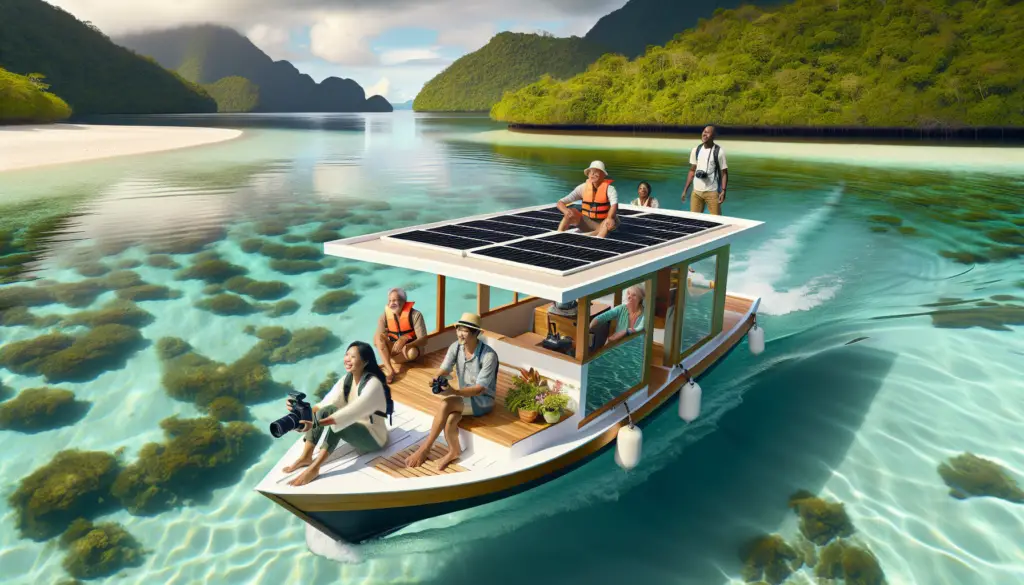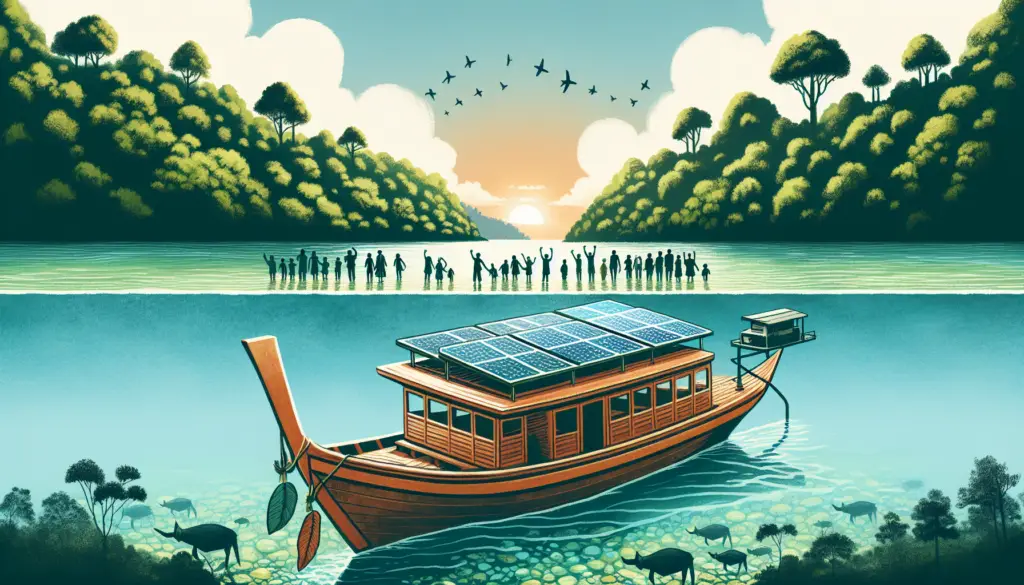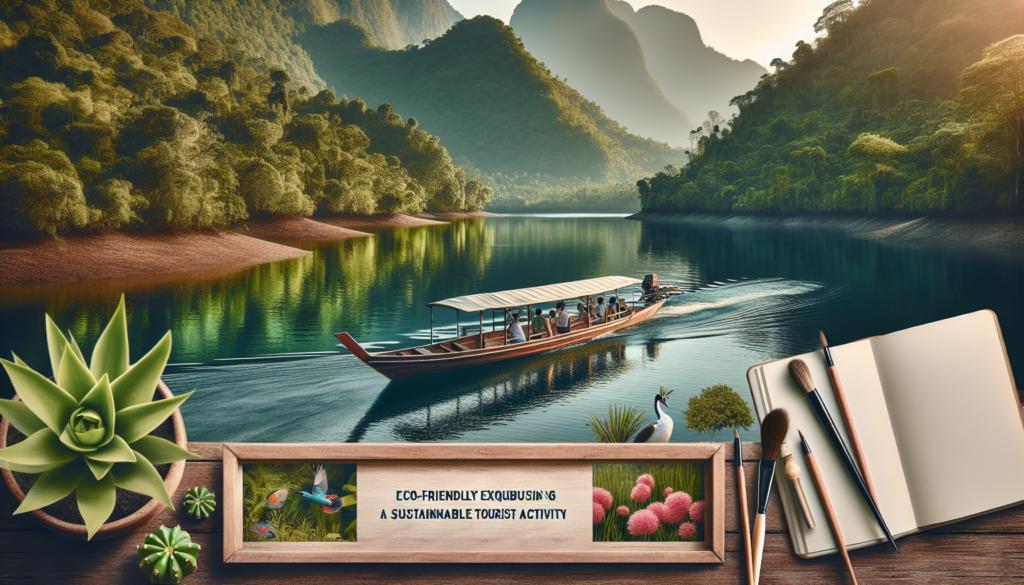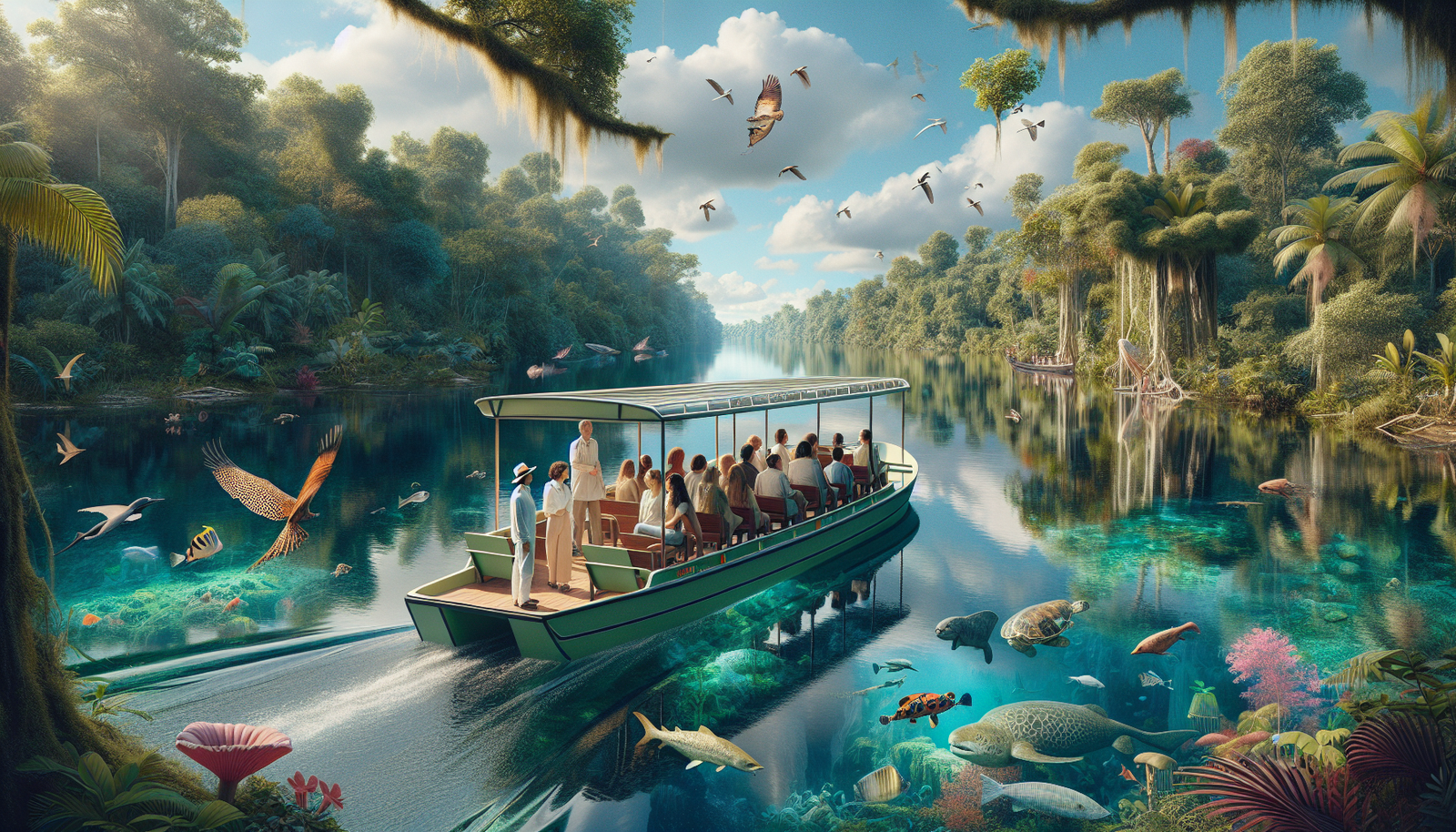You’re about to embark on an exhilarating journey with us, unveiling the numerous benefits of eco-tourism, particularly through boating expeditions. As soon as we set sail, you’ll soon discover that not only does eco-tourism tantalize the senses with its sheer beauty and diversity of landscape, but it also serves as a significant driver for the conservation of pristine ecosystems. Plus, let’s not forget the invigorating thrill you experience when stepping into the untamed wilderness. Prepare yourself for a multitude of these eco-friendly rewards as we navigate the waters of this exciting topic!

Understanding Eco-Tourism
Definition of Eco-Tourism
Eco-tourism can be defined as a responsible journey to natural regions that conserves the environment and boosts the wellness of local people, with an emphasis on visitor education and active civic participation. The concept of eco-tourism motivates tourists to a global understanding of the environment and deeper respect for our Earth, promoting sustainability and conservation.
Importance of Eco-Tourism
Eco-tourism has quickly gained importance as a platform to curtail the adverse effects of mass tourism on the environment and local cultures. It encourages environmental protection through rewarding economy-building activities, protects cultural heritage, supports the well-being of local residents, and educates visitors on sustainability. The focus on conservation and sustainability ensures we preserve spaces for future generations.
Difference between Eco-Tourism and Traditional Tourism
Previously, traditional tourism has been less concerned about environmental impacts and more focused on individuals’ enjoyment. On the other hand, eco-tourism stresses responsible travel towards preserving delicate ecosystems and encourages visitors to be mindful of their impact on the environment, developing an understanding of local cultures and eco-systems.
The Role of Boating Expeditions in Eco-Tourism
Use of Sustainable Boats
Sustainable boats, manufactured using sustainably sourced materials and powered using renewable energy sources instead of fuel, play an integral role in boating eco-tourism. This choice helps reduce carbon emissions and other environmental pollutants that could harm marine ecosystems.
Exploring Natural Environments
Boating expeditions provide a unique possibility to explore aquatic environments, allowing individuals to experience the wonders of marine life firsthand. This exposure can cultivate an appreciation for these incredible life forms and habitats, encouraging visitors to support efforts to protect and preserve them.
Promoting Conservation
Boating expeditions not only offer exposure to marine life but also educate tourists about significant conservation issues impacting these habitats. This understanding can inspire individuals to adjust their lifestyle and choices to benefit the environment more broadly, highlighting their role in marine conservation.

Environmental Benefits of Boating Expeditions
Limiting Carbon Footprint
Boating expeditions, particularly when using sustainable boats, help limit an individual’s carbon footprint. These boats often use renewable resources like solar power for propulsion instead of fossil fuels, leading to a significant reduction in CO2 emissions.
Promotion of Clean Oceans
Boating eco-tourism can also promote cleaner oceans by raising awareness about the problems of marine pollution and inspiring change in tourist behavior. Proper waste disposal, avoiding single-use plastics, and encouraging more responsible actions can significantly contribute to cleaner oceans.
Biodiversity Preservation
By focusing on responsible wildlife interactions and conservation importance, boating eco-tourism can contribute to the preservation of marine biodiversity. It not only enlightens tourists about different species but also about the importance of maintaining the balance in marine ecosystems.
Socio-Economic Benefits of Boating Eco-Tourism
Engagement and Upliftment of Local Communities
Boating eco-tourism aids in the upliftment and empowerment of local communities. It provides them with an income source and teaches them to value their natural resources, promoting a culture of conservation.
Creating Sustainable Employment
Boating eco-tourism potentially creates new job opportunities by stimulating the local economy. From tour guides to boat operators, this type of tourism offers various roles promoting sustainable employment.
Boosting Local Economies
As tourists spend money on local services and goods, boating eco-tourism can stimulate the local economy, bringing newfound economic prosperity to these regions.

Education and Research Opportunities from Boating Expeditions
Understanding Marine Ecology
Boating expeditions offer an excellent opportunity to understand marine ecology. From observing marine habits to understanding their roles in the ecosystem, it offers a wealth of knowledge.
Eco-Citizen Science Initiatives
These expeditions can engage tourists in eco-citizen science initiatives, contributing to vital research projects. This hands-on involvement not only enriches the tourist’s experience but also lends useful data to conservation efforts.
Foster Ecological Sensitivity
By engaging close and personal with marine wildlife, tourists can develop a deeper connection with these beings and their habitats. This connection can foster ecological sensitivity, encouraging more sustainable choices in daily life.
Practices and Recommendations for Eco-Friendly Boating
Use of Eco-Friendly Materials in Boat Building
To make boating more sustainable, it is recommended to use ecologically friendly materials in boat construction. Options could include sustainably harvested wood or recycled materials.
Responsible Wildlife Watching
Ensuring that wildlife is observed responsibly should be given paramount importance. Tourists should be educated on not to cause stress or harm to the wildlife by maintaining a respectful distance and not trying to touch or feed them.
Reducing Waste during Expeditions
Implementing strategies to reduce waste during boating expeditions can significantly contribute to marine health. From avoiding single-use plastics to properly disposing of waste, every effort can make a difference.

Challenges and Limitations of Boating Eco-Tourism
Over-Tourism
Over-tourism presents a significant challenge to boating eco-tourism. Increased tourism can disrupt the essential habitats of marine life, making striking a balance between tourism and preservation vital.
Potential Disturbances to Wildlife
Unregulated tourist behavior may lead to disturbances to marine wildlife, which could undermine conservation goals. Hence, a great deal of responsibility and understanding is required from the tourists.
Risk of Marine Pollution
While boating eco-tourism promotes clean oceans, carelessly disposed of waste could result in added marine pollution, emphasizing the importance of responsible waste disposal.
Promoting Sustainable Boating Tourism
Involving Governments and Policy Makers
For sustainable boating tourism to succeed, it’s critical to involve governments and policymakers in creating regulations and infrastructure that support it. Their backing can go a long way in establishing and maintaining this form of tourism.
Role of Tourism Industries
The tourism industry must actively promote and practice sustainable boating tourism. They can incorporate responsible practices and educate their customers, fostering a culture of conservation and eco-friendliness.
Public Awareness and Education
Public education about the importance of sustainable boating and ecotourism is key to its promotion. With knowledge and understanding, the public would be more likely to support and participate in these practices.
Case Studies of Successful Boating Eco-Tourism
Galapagos Islands
The Galapagos Islands are a prime example of successful boating eco-tourism. They have incorporated strict practices and guidelines to balance the requirements of tourism and conservation, simultaneously protecting their unique ecosystem.
Norwegian Fjords
The Norwegian Fjords, with its picturesque views, has effectively utilized sustainable boating to boost tourism while prioritizing environmental conservation. Visitors can revel in the natural beauty while ensuring they do not harm the marine ecosystem.
Great Barrier Reef
Boating expeditions in the Great Barrier Reef demonstrate successful implementation of boating eco-tourism. Sustainable practices, such as proper waste disposal and the use of eco-friendly boats, allow tourists to marvel at the reef’s beauty without harming its delicate ecosystem.
Future Trends in Boating Eco-Tourism
Increasing Popularity of Marine Park Visits
Marine parks offer unique opportunities to observe marine life in their natural habitats, and their popularity is set to grow. Visitors can learn about the importance of ocean conservation while enjoying a boat ride.
Advent of Tech-Enabled Eco-Tourism
The future of boating eco-tourism is showing a trend towards technology. Innovations like electric boats or using virtual reality for wildlife views are being incorporated to make eco-tourism more sustainable.
Spotlight on Marine Conservation
As awareness about the planet’s dire environmental crises grows, marine conservation becomes more significant than ever. Conservation focus areas, like coral restoration and responsible fishing, would feature prominently in future boating eco-tourism.


[…] about to embark on a journey through the fascinating world of eco-tourism and boating, where conservation and education take center stage. As you navigate this article, you’ll […]